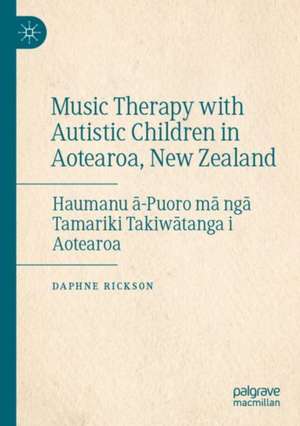Music Therapy with Autistic Children in Aotearoa, New Zealand: Haumanu ā-Puoro mā ngā Tamariki Takiwātanga i Aotearoa
Autor Daphne Rickson Cuvânt înainte de Dr. Grace Thompsonen Limba Engleză Paperback – 26 iun 2023
In this unique text, ten cases of music therapy with autistic children (tamariki takiwātanga) are critiqued through the eyes of family members and other autism experts. Rickson uses her wealth of experience to contextualise their rich observations in a thorough review of research and practice literature, to illustrate the ways music therapists engage autistic children in the music therapy process, highlight the various ways music therapy can support their health and well-being, and demonstrate how music therapy processes align with good practice as outlined in the New Zealand Autism Spectrum Disorder Guideline.
| Toate formatele și edițiile | Preț | Express |
|---|---|---|
| Paperback (1) | 785.86 lei 6-8 săpt. | |
| Springer International Publishing – 26 iun 2023 | 785.86 lei 6-8 săpt. | |
| Hardback (1) | 789.35 lei 6-8 săpt. | |
| Springer International Publishing – 25 iun 2022 | 789.35 lei 6-8 săpt. |
Preț: 785.86 lei
Preț vechi: 958.37 lei
-18% Nou
Puncte Express: 1179
Preț estimativ în valută:
150.41€ • 156.42$ • 125.86£
150.41€ • 156.42$ • 125.86£
Carte tipărită la comandă
Livrare economică 14-28 martie
Preluare comenzi: 021 569.72.76
Specificații
ISBN-13: 9783031052354
ISBN-10: 3031052358
Ilustrații: XXV, 396 p. 6 illus., 1 illus. in color.
Dimensiuni: 148 x 210 mm
Greutate: 0.55 kg
Ediția:1st ed. 2022
Editura: Springer International Publishing
Colecția Palgrave Macmillan
Locul publicării:Cham, Switzerland
ISBN-10: 3031052358
Ilustrații: XXV, 396 p. 6 illus., 1 illus. in color.
Dimensiuni: 148 x 210 mm
Greutate: 0.55 kg
Ediția:1st ed. 2022
Editura: Springer International Publishing
Colecția Palgrave Macmillan
Locul publicării:Cham, Switzerland
Cuprins
1 Autism Spectrum Disorder (ASD) or Autism Spectrum Conditions (ASCs)?.- 2 Music Therapy with Children who have Autism Spectrum Conditions.- 3 An Innovative Research Design.- 4 Strength in numbers: Findings from the questionnaires?.- 5 “Lots of reasons to smile”: Ten case studies of individual music therapy.- 6 Cognitive, emotion, and sensory regulation.- 7 “An amazing therapy”: Supporting the development of interpersonal communication.- 8 “Music creates a gravitational pull”: Children’s musicality, therapists’ skills, and collaboration.- 9 Music Therapy Approaches.- 10 Planning and goal setting.- 11 Evaluation and Narrative Assessment.- 12 A quiet little oasis”, “a space in which to “burn”, or “isolated away from the class”?.- 13 Inclusion.- 14 Is music therapy an evidence-based practice?.- 15 Feelings are very confusing.- 16 Music therapy is perceived to support regulation.
Notă biografică
Daphne Rickson is an Adjunct Professor in music therapy at Te Herenga Waka, Victoria University of Wellington, New Zealand. She has family experience of autism and has worked with many autistic children (tamariki takiwātanga) and their families. Her research focus has primarily involved critical analysis of the concept of disability and investigation into music as an inclusive resource.
Textul de pe ultima copertă
"Rickson is fiercely insightful in this well-timed text. Using compelling research, she argues convincingly for the rights of autistic children to access the gravitational pull of music; and clearly demonstrates the ways in which music therapists carefully craft music therapy processes, with sensitivity and respect, to maximise their engagement".
—Professor Katrina Skewes McFerran, Co-Director and Head of Program (Creative Arts Therapy), University of Melbourne, Australia
"Sharing narratives from ten music therapists through the eyes of ‘experts’ around each child within their everyday life, education, or the field of autism this book presents an outstanding, innovative approach to case study research. The rich and detailed descriptions of what works for whom are a must read for any therapist, educator, student, parent, or policy-maker who wants to question what really matters and how music therapists and collaborative partners might co-create the future".
—Emma Maclean, Lecturer in Music Therapy, Queen Margaret University, Musselburgh, Scotland
—Emma Maclean, Lecturer in Music Therapy, Queen Margaret University, Musselburgh, Scotland
In this unique text, ten cases of music therapy with autistic children (tamariki takiwātanga) are critiqued through the eyes of family members and other autism experts. Rickson uses her wealth of experience to contextualise their rich observations in a thorough review of research and practice literature, to illustrate the ways music therapists engage autistic children in the music therapy process, highlight the various ways music therapy can support their health and well-being, and demonstrate how music therapy processes align with good practice as outlined in the New Zealand Autism Spectrum Disorder Guideline.
Daphne Rickson is an Adjunct Professor in music therapy at Te Herenga Waka, Victoria University of Wellington, New Zealand. She has family experience of autism and has worked with manyautistic children (tamariki takiwātanga) and their families. Her research focus has primarily involved critical analysis of the concept of disability and investigation into music as an inclusive resource.
Daphne Rickson is an Adjunct Professor in music therapy at Te Herenga Waka, Victoria University of Wellington, New Zealand. She has family experience of autism and has worked with manyautistic children (tamariki takiwātanga) and their families. Her research focus has primarily involved critical analysis of the concept of disability and investigation into music as an inclusive resource.
Caracteristici
Explores the effectiveness of music therapy for children with autism spectrum conditions Makes use of narrative assessment to analyse findings Discusses whether music therapy could be considered an evidence-based practice
